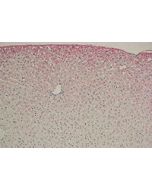Cookie Policy: This site uses cookies to improve your experience. You can find out more about our use of cookies in our Privacy Policy. By continuing to browse this site you agree to our use of cookies.
JaICA
anti-Acrolein [ACR], mAb (5F6)

| Product Details | |
|---|---|
| Product Type | Monoclonal Antibody |
| Properties | |
| Clone | 5F6 |
| Isotype | Mouse IgG1κ |
| Immunogen/Antigen | ACR-modified keyhole-lympet hemocyanine. |
| Application |
Immunohistochemistry: Recommended concentration is 0.5-1μg/mL on paraffin sections. |
| Crossreactivity |
All Human |
| Specificity |
Recognizes ACR-modified proteins (especially FDP-lysine type derivatives). |
| Purity Detail | Protein A purified. |
| Formulation | Frozen liquid. Contains 10mM PBS, 0.1% NaN3 and 0.5% BSA. |
| Isotype Negative Control | |
| Other Product Data |
Click here for Original Manufacturer Product Datasheet |
| Declaration | Manufactured by JaICA. |
| Shipping and Handling | |
| Shipping | BLUE ICE |
| Short Term Storage | +4°C |
| Long Term Storage | -20°C |
| Handling Advice | Avoid freeze/thaw cycles. |
| Use/Stability | Stable for at least 3 years after receipt when stored at -20°C. |
| Documents | |
| Product Specification Sheet | |
| Datasheet |
 Download PDF Download PDF |
Acrolein (ACR) is a representative carcinogenic aldehyde found ubiquitously in the environment and formed endogenously through oxidation reactions, such as lipid peroxidation and myeloperoxidasecatalyzed amino acid oxidation. ACR is highly reactive aldehyde and reacts with lysine residue in protein. The reaction with ACR and lysine residue leads to the formation of numerous numbers of adducts, such as formyl-dehydropiperidino-lysine (FDP-lysine) type derivative.
- Protein-bound acrolein: Potential markers for oxidativestress: K. Uchida, et al.; PNAS 95, 4882 (1998)
- Protein-bound acrolein: A novel markers of oxidativestress in Alzheimer's Disease: Y. Noel, et al.; J. Neurochem. 72, 751 (1999)







![anti-4-Hydroxy-2-hexenal [4-HHE], mAb (HHE53)](https://update.adipogen.com/media/catalog/product/placeholder/default/adipogen_logo_bw_3.png)
